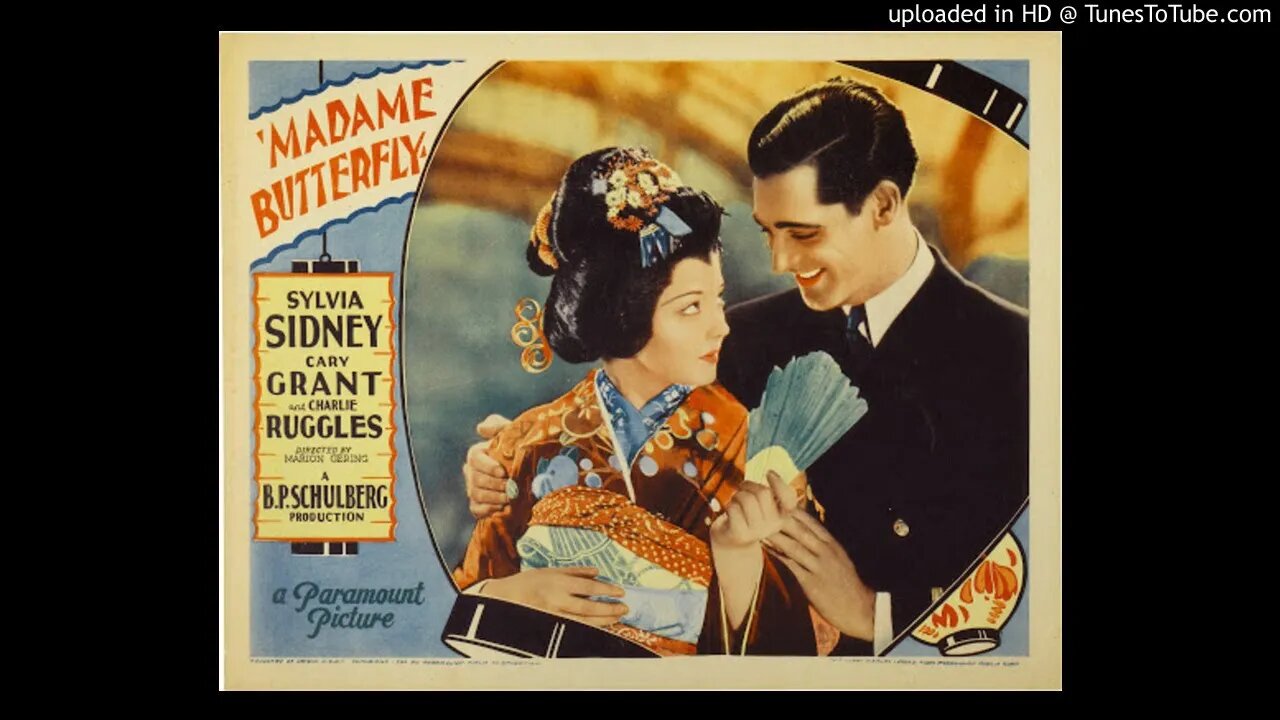Premium Only Content

Madame Butterfly - Cary Grant & Grace Moore - All-Star Radio Dramas of Classic Films
Madame Butterfly is a 1932 American pre-Code drama film directed by Marion Gering, based on David Belasco's play and the story by John Luther Long. It was adapted by Josephine Lovett and Joseph Moncure March. It stars Cary Grant and Sylvia Sidney. Music is credited to W. Franke Harling (although much of it is an adaptation of Giacomo Puccini's opera Madama Butterfly), cinematography by David Abel, art direction by Ward Ihnen. It premiered on December 30, 1932.
Lux Radio Theatre, sometimes spelled Lux Radio Theater, a classic radio anthology series, was broadcast on the NBC Blue Network (1934–35) (owned by the National Broadcasting Company, later predecessor of American Broadcasting Company [ABC] in 1943–1945); CBS Radio network (Columbia Broadcasting System) (1935–54), and NBC Radio (1954–55). Initially, the series adapted Broadway plays during its first two seasons before it began adapting films. These hour-long radio programs were performed live before studio audiences. The series became the most popular dramatic anthology series on radio, broadcast for more than 20 years and continued on television as the Lux Video Theatre through most of the 1950s. The primary sponsor of the show was Unilever through its Lux Soap brand.
Broadcasting from New York, the series premiered at 2:30 p.m., October 14, 1934, on the NBC Blue Network with a production of Seventh Heaven starring Miriam Hopkins and John Boles in a full-hour adaptation of the 1922–24 Broadway production by Austin Strong. The host was the show's fictional producer, Douglass Garrick (portrayed by John Anthony). Doris Dagmar played another fictional character, Peggy Winthrop, who delivered the Lux commercials. Each show featured a scripted session with Garrick talking to the lead actors. Anthony appeared as Garrick from the premiere 1934 episode until June 30, 1935. Garrick was portrayed by Albert Hayes from July 29, 1935, to May 25, 1936, when the show moved to the West Coast.
Famed studio executive and film producer / director Cecil B. DeMille, (1881-1959), took over as the host on June 1, 1936, continuing until January 22, 1945. That initial episode with DeMille featured stars Marlene Dietrich and Clark Gable in The Legionnaire and the Lady. On several occasions, usually when he was out of town, he was temporarily replaced by various celebrities, including Leslie Howard and Edward Arnold.
Lux Radio Theatre strove to feature as many of the original stars of the original stage and film productions as possible, usually paying them $5,000 an appearance. In 1936, when sponsor manufacturer Lever Brothers (who made Lux brand soap and detergent) moved the show from New York City to Hollywood, the program began to emphasize adaptations of films rather than plays. The first Lux film adaptation was The Legionnaire and the Lady, with Marlene Dietrich and Clark Gable, based on the film Morocco. That was followed by a Lux adaptation of The Thin Man, featuring the movie's actual stars, Myrna Loy and William Powell.
-
 18:12:15
18:12:15
Chesterton Radio
1 year ago $3.19 earnedChristmas Radio Live - Holiday Fun All-Day Live Stream
31.7K3 -
 2:16:01
2:16:01
George Galloway
1 day agoNEW YEAR COUNTDOWN - MOATS with George Galloway - EP 408
145K246 -
 18:39
18:39
Stephen Gardner
17 hours ago🔥BREAKING! Trump's SHOCKING New Demand | Biden admits DOJ TARGETED Trump Illegally!
112K509 -
 1:20:23
1:20:23
Josh Pate's College Football Show
23 hours ago $16.17 earnedCFP Prediction Special: OhioSt vs Oregon | UGA vs Notre Dame | Texas vs ASU | Boise vs PennSt
133K6 -
 7:50:03
7:50:03
Scottish Viking Gaming
21 hours ago💚Rumble :|: SUNDAY FUNDAY :|: Virginia has two Verginers, Change my Mind!
135K18 -
 1:49:50
1:49:50
Winston Marshall
2 days agoThe DARK Reality of Socialism - Historian Giles Udy
107K128 -
 1:09:28
1:09:28
Sports Wars
20 hours agoBengals STAY ALIVE In OT Thriller, ESPN's Ryan Clark SLAMMED, NFL DESTROYS NBA On Christmas
88.3K19 -
 9:37
9:37
EvenOut
1 day ago $5.79 earnedThe Non-Reflecting Mirror Scare Twin Prank!
75.1K5 -
 11:19
11:19
Tundra Tactical
1 day ago $7.32 earnedI Saw How CMMG Makes Guns.
79.3K8 -
 15:34
15:34
Misha Petrov
1 day agoReacting To TikTok’s Most DELUSIONAL Takes!
89.1K81